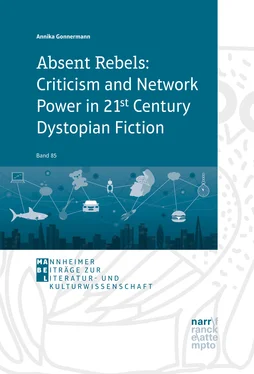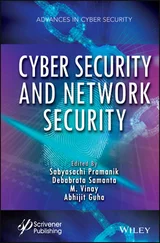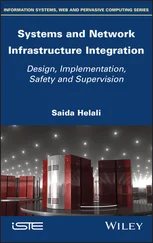The IT Whizz-Kid becomes a phantom with no name and, more importantly, with no internet history, and thus no network membership. Mae’s attempts to get hold of him are fruitless. Even ‘zinging’ about him (the Circle version of ‘tweeting’ and posting on Instagram), by tapping the swarm intelligence of the Circle – a strategy that yields spectacular results in Mercer’s case – is futile: “She put out a few all-company zings, looking for a Kalden, careful not to look desperate. But she got no response” (ibid. 171). The moment initiating Kalden’s demise is the moment he starts to combat network power. He approaches Mae, hoping to convince her to stop the Circle: “I didn’t picture a world where Circle membership was mandatory, where all government and all life was channeled through one network” (ibid. 485). Unable to contain the forces he has unleashed, Kalden tries to persuade Mae to prevent the Completion of the Circle (the monopoly of the Circle), erroneously believing that Mae would agree with his opinion:
‘We’re closing the circle around everyone—it’s a totalitarian nightmare.’
‘And it’s my fault?’
‘No, no. Not at all. But you’re now the ambassador. You’re the face of it. The benign, friendly face of it all.’ (ibid. 486)
Kalden’s attempt to stop the Circle from completing, however, backfires. Ultimately, he also demonstrates that he has not understood the mechanism behind network power, hence his plan to rebrand the eutopian Circle as totalitarian; simply launching a new marketing campaign with Mae’s help proves naïve and futile. The Circle’s power is based on the free and (in)voluntary decisions made by millions of individuals, who cannot revoke their approval even if told to do so.
Both Mercer’s and Kalden’s rebellions fail before they have even started. Therefore, Roman Halfmann argues that their attempts can barely be taken seriously as truly wholehearted plans to change the system but that they remain “foolishly staged clichés” never meant to fulfil the genre criteria of rebellion in the first place (cf. 276, own translation). Instead, The Circle is a decidedly contemporary dystopia in which, according to Gregory Claeys, “the revolutionary overthrow of the system, for either better or worse, is rarely ever encountered” ( History 495). Mercer’s death/suicide is the only way to opt out of the system (cf. Gellai 302) – a decidedly pessimistic and bleak outlook for those uncomfortable with corpocratic power. The text does not offer an escapist reading, depicting eutopian enclaves that have so far resisted the Circle’s hegemony. Unlike Nineteen Eighty-Four and its forest enclave, Brave New World and its Indian reservation, or We and the forest behind the wall, The Circle does not provide relief in the form of untouched remote eutopian islands since – other than the juridico-political form of power, which rests considerably on the influence of one individual over a certain territory – network power is systemic in nature and bound to individuals, rather than soil. One way or another, “every character is affected by the company” (Lehnen 99): Annie and Mae are defined by their position within the Circle, Mercer and Mae’s parents by their opposition to it. This, however, has nothing to do with their actual spatial position, although Mae comes to spend an increasing amount of her free time on campus. The Circle is where the characters are – wherever that might be.
Having eradicated physical boundaries, the company ultimately aims at removing also psychological and mental borders: certain that she has averted ‘apocalypse’ in the form of Kalden’s attempt to destroy the Circle, Mae is already devising the next moves. As the company has conquered all of the earth and with nowhere left to go, she is annoyed to not be able to know Annie’s thoughts after the latter has fallen into a coma due to stress and exhaustion:
Mae felt a twinge of envy. She wondered what Annie was thinking. Doctors had said that she was likely dreaming; they’d been measuring steady brain activity during the coma, but what precisely was happening in her mind was unknown to all, and Mae couldn’t help feeling some annoyance about this. There was a monitor visible from where Mae sat, a real-time picture of Annie’s mind, bursts of color appearing periodically, implying that extraordinary things were happening in there. But what was she thinking? ( TC 496)
Despite all the technology and power accumulated by the company, the “bursts of color appearing periodically” evade translation, leaving Mae frustrated and annoyed: “but what was she thinking?” Eager to colonise the human mind itself, which has been shielded off by the materialism of the human body to date (Mae marvelled “at the distance this flesh put between them,” ibid. 497), Mae’s next project is revealed to be a programme to read minds and thoughts. There truly is “no escaping the Circle” (J. Winter). Thus, it is only a matter of time until the final frontier will fall.
Конец ознакомительного фрагмента.
Текст предоставлен ООО «ЛитРес».
Прочитайте эту книгу целиком, купив полную легальную версию на ЛитРес.
Безопасно оплатить книгу можно банковской картой Visa, MasterCard, Maestro, со счета мобильного телефона, с платежного терминала, в салоне МТС или Связной, через PayPal, WebMoney, Яндекс.Деньги, QIWI Кошелек, бонусными картами или другим удобным Вам способом.












